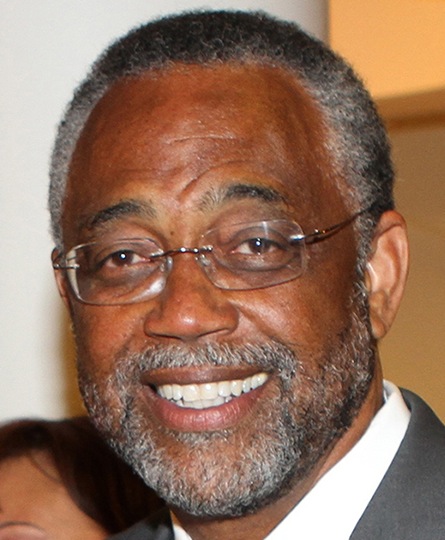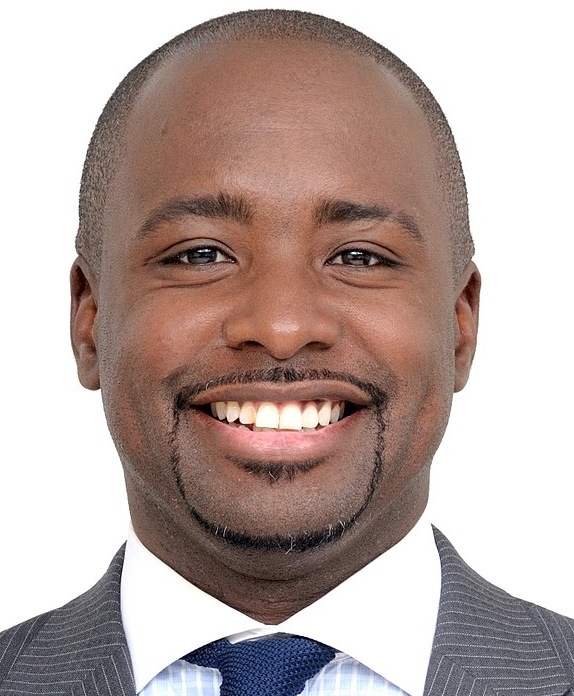Fire victims don’t want handout, Sharpton says

Activists call for ‘same justice’ as Palisades, Malibu

With attorney Ben Crump at his left, Rev. Al Sharpton addresses the media outside a Pasadena church Feb. 6 where he spoke to victims of the Eaton fire that damaged Pasadena and Altadena last month. Sharpton said ‘Altadena will rise from the ashes — on our terms.”
Photo by Lorenzo Gomez
By Stephen Oduntan
Contributing Writer
PASADENA — The Rev. Al Sharpton criticized previous disaster recovery efforts for Black property owners, saying they bordered on systemic neglect.
Sharpton spoke Feb. 6 at the First AME Church in Pasadena during a service to honor victims of the devastating wildfires that swept through Pasadena and Altadena last month, leaving at least 29 dead and displacing thousands.
“This community has in its very soil freedom fighting,” Sharpton said. “These folks are not asking for a handout. We paid our taxes, our utility bills, we did everything we were supposed to do — yet here we are, forced to fight for what should be ours.”
The Eaton Fire, which broke out Jan. 7, scorched 14,000 total acres and wreaking havoc in Altadena, a historically Black community, destroying thousands of homes and erasing generations of wealth. A UCLA data brief released earlier this month week found that 48% of Black households in the area lost their homes, compared to 37% of non-Black households.
A central issue raised at the gathering was Southern California Edison’s possible role in causing the fire. Civil rights attorney Ben Crump, representing families who lost loved ones, pointed to video evidence that appears to show a power line explosion igniting the Eaton Fire.
“We know that California law requires power companies to de-energize lines in extreme fire conditions,” Crump said. “We also know that Edison did not do that. If they had, we could have saved lives.”
Edison has acknowledged that its equipment may have played a role in the disaster. In a public statement, Edison International CEO Pedro J. Pizarro said, “While we do not yet know what caused the Eaton wildfire, SCE is exploring every possibility in its investigation, including the possibility that our equipment was involved.”
Community members also expressed outrage over the delayed evacuation warnings for East Altadena, which has a predominantly Black population.
“We still are trying to figure out why West Altadena got noticed seven hours earlier before East Altadena, where most [Blacks] live,” Crump said.
The discrepancy in emergency response times has fueled allegations of neglect and systemic inequities in disaster preparedness. Residents are calling for a full investigation into whether the lack of timely warnings contributed to the death toll.
Speakers at the event emphasized that Altadena is more than just a community lost to flames — it is a symbol of Black generational wealth in California.
Sharpton highlighted the abolitionist roots of Altadena, noting that Owen Brown, the son of 19th-century abolitionist John Brown, settled there in 1857 and helped buy freedom for enslaved people.
“This community was built on the basis of abolitionism. It has in its very soil freedom fighting,” Sharpton said. “And now, that legacy is in jeopardy.”
Many residents say insurance payouts have been insufficient, as they fail to reflect the true value of generational homes that have appreciated far beyond their original purchase prices.
Families directly impacted by the fire took to the podium, sharing their heartbreak. Zaire Calvin, the brother of Evelyn McClendon, spoke about his mother’s unbearable grief.
“She lost three sons — one to murder, one to diabetes, and now one to this fire,” he said. “How much loss can one mother bear?”
His story was similar to those of many residents who feel abandoned in the aftermath of the fire. Survivors remain displaced in motels, struggling to rebuild as government aid stalls and insurance claims drag on.
Crump, joined by Anne Andrews and other legal representatives, vowed to pursue lawsuits against Edison and push for stronger policies to prevent similar disasters.
“We don’t want ‘half-justice’ for Black families,” Crump said. “We want the same justice being offered to those in Hollywood Hills and Malibu. Anything less is unacceptable.”
With lawsuits expected to mount in the coming weeks, community leaders stress that the rebuilding process must be fair and inclusive, ensuring that historically Black neighborhoods are not left behind.
The gathering ended with a firm message of resilience, as leaders vowed to hold Edison, insurance companies and policymakers accountable.
“We all are one, and we will not stand by and let this community be erased,” Sharpton said. “Altadena will rise from the ashes — on our terms, at the value we deserve.”
Residents and advocates are demanding immediate relief, including full compensation for destroyed homes, legislative reforms to prevent future utility-caused fires, and an equitable rebuilding process.
Stephen Oduntan is a freelance reporter for Wave Newspapers.





